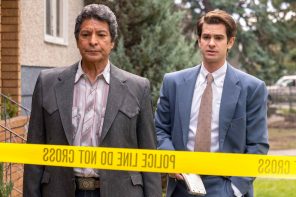Why would an avuncular Mormon writer ask a woman he’s just met to pretend she’s a whore and he’s the john who has purchased her services?
To me, the most likely answer is: because that’s how he wants to treat her.
This isn’t a hypothetical: it happened between Salt Lake Tribune humorist Robert Kirby and Mormon blogger C. Jane Kendrick (aka Courtney Clark Kendrick) at the Sunstone Symposium in July. In response to Kirby’s column this week criticizing McKenna Denson, who is suing The Church of Jesus Christ of Latter-day Saints over its role in an alleged attempted rape by a high-ranking church official, Kendrick posted on Facebook her account of Kirby’s behavior:
In July I met Robert Kirby for the first time just before I did a Sunstone session with him. The very first thing he said to me when we were alone in the convention center hallway was, “Let’s pretend I picked you up from an escort service and we’ll walk over to that table over there together and sit down and chat.”
Kirby posted an apology Thursday on his page, acknowledging that “much of what she describes in her account took place, albeit without some of the more sinister intentions many have alluded to.”
Kirby’s defenders may likely protest that my framing of the interaction also exhibits “sinister intentions.” So let’s consider two other framings.
Kirby didn’t appear to be asking for sex. Instead, he seems to have wanted a fantasy to surround his interactions with Kendrick.
Why?
Why would a well-established male journalist say to a female blogger young enough to be his daughter, “Hey, even though there’s no reason to sexualize our interactions, let’s sexualize them anyway!”? Maybe he wanted to feel young and frisky and cool, and thought he deserved to feel those things at her expense?
In our collective imagination, prostitutes are people whose consent can be purchased, after which it cannot be withdrawn.
Why would a Mormon patriarch—even an unorthodox Mormon patriarch who derives an edge from challenging the status quo while making clear how much he’s still part of it—ask a Mormon woman to pretend he has purchased the right to do whatever he wants to her?
It’s not just that Kirby asked Kendrick to pretend she’s a prostitute. He persuaded her to consume “edibles” (marijuana), and then announced to a public audience that he’d done this, knowing full well that Sunstone records most of its sessions. Recreational marijuana is illegal in Utah (though medical marijuana will be on Utah ballots in November). I’m no expert on Utah’s criminal code, but I have a strong suspicion that it might have something to say about Kirby’s actions.
In Down Girl: The Logic of Misogyny, Kate Manne argues that in patriarchal cultures, “a woman is regarded as owing her human capacities to particular people… her personhood is held to be owed to others, in the form of service labor, love, and loyalty. ” It seems obvious to me that Kirby felt entitled to exploit Kendrick’s human capacities to bolster his own. Under Manne’s definition, Kirby’s actions are classic misogyny.
In Kirby’s apology, he professes to have “no idea” that he made Kendrick uncomfortable with his “joking around at Sunstone.”
Misogyny is often presented as a failure of empathy (“How would you feel if someone did that to your wife or daughter?” etc etc, a question that asks men to empathize with other men, not with women), and it certainly is, but it can also be a failure of imagination, period.
Could Kirby, who earns his living “lampooning life in Zion”—or presenting Utah and Mormon behavior in an unflattering light—really not imagine how his behavior might look from any viewpoint but his own? The problem, he writes in his apology, is that he “misjudged how she would take [his] sense of humor.” Really? Does he normally get a good response to asking women he’s just met to pretend they’re prostitutes he’s purchased? Has he used the line before? Has he asked the women in his life, “Hey, how funny would it be if I asked a woman my daughter’s age to pretend she’s a whore?” Did the women who know him best give him a thumbs up and say the joke was a good one?
Kirby writes, “I believe this entire thing could have been resolved amicably if she had contacted me as soon as possible.” What would Kendrick have contacted him about? What was there to resolve? The misjudgment was entirely his, but again he imagines that somehow Kendrick owes him the labor of figuring out how to see him in the most flattering light.
Which, of course, is something humor writers rarely grant the people they write about.




